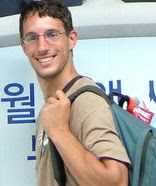The laundry element of our trip comes usually once a week. It includes having access to a washing machine, understand how it works, find washing powder and research for enough space to hang our clothes.
While in Eastern Europe and European Russia it was very much like at home - we were couchsurfing, people had washing machine similar to ours and would give us washing powder and place to hang -, things changed since we arrived to Ulan-Ude and we went to the Buryatia School.
At the school there were no washing machines and the job was done in the banya, the kind of sauna room, where we heated the water and handwash the clothes.
After that was the Severobaikalsk experience to show our landlady how a washing machine works and we had our first surprise of a washing machine which does not have a water boiler included. It receives water from the cold and hot water taps and uses at the temperature it comes. You can only choose if to use only the cold tap, or only the hot or both. The drum on those kind of machines is vertical, which seems not to mix so well the clothes and you also choose how much water it should put in, as the machines are huge (9kg or more) and there is no sensor of where the clothes end. I was impressed by that machine in Severobaikalsk, our first incursion to deep Siberia, land of the BAM railway. I was just saying "this is a russian washing machine, elsewhere they are more advanced, this is just a cheap product".
Our washing in Russia after that was on the basin, as we could not find neither laundries (well, we did find one in Komsolmolsk but seemed more a industrial one for hotels) . We had a travelling laudry tube for hand washing which served well.
Arrived to Japan it was the paradise. Coin launderettes on every corner (almost) which drying machines and you could easily buy in drugstores individual packages of washing powder. Due the humidity and consequent sweating we washed twice in a week. However the machines were very simple (and old) and no choice of temperature and once we were sure that was only cold water used...
Now we are in Korea (soon in China) and we are amazed as the washing machines are the same that we found in Russia! Just that the buttons are in Korean but with google language tools this is not a problem (in China will be, I don't know how to write in chinese keyboards). And here we also see that this huge machines sometimes only have cold water in, and no way to warm it. So wash with cold water is the only solution. Result: towels start to have a funny smell after two days, socks are not completely clean as we wish. Fortunately in the motel we are staying now the washing machine had hot water and we did wash everything with the boiling (60 degrees?) water, even clothes that are supposed to go on 30, but well, not so much choice.
Lets hope in China things will not be difficult!
Visualizar Next stop: where? em um mapa maior
28 August 2009
27 August 2009
South Korea - Gyeongju and around
Our next stop was Gyeongju, close to the southeastern coast. The city is known for its "tumuli parks", which are basically ancient graveyards. People here are still buried under little mounds of earth, but in ancient times these mounds could be huge if they contained the tomb of a king or somebody important:
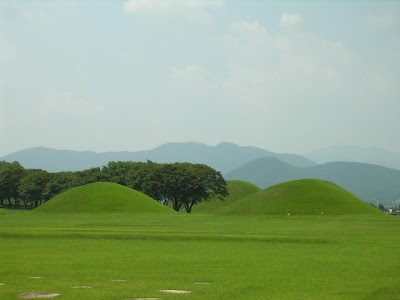 I guess it's not the best season, but there are some huge and beautiful lotus ponds:
I guess it's not the best season, but there are some huge and beautiful lotus ponds:

One day we visited Bulguksa temple. Now we have seen a lot of temples, but this was definitely my favourite one. There was this old stone pagoda:
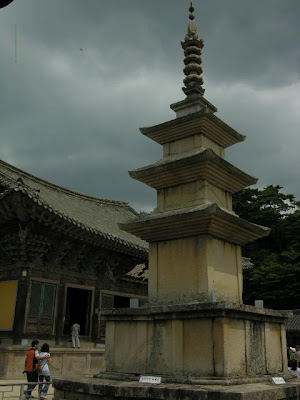 You might be able to see a couple of grey "boxes" on the first "floor" of the pagoda, these were devices to measure the inclination, and there were other devices to measure tiny movements of the pagoda, I guess it's quite fragile and could fall if it got destabilised.
You might be able to see a couple of grey "boxes" on the first "floor" of the pagoda, these were devices to measure the inclination, and there were other devices to measure tiny movements of the pagoda, I guess it's quite fragile and could fall if it got destabilised.
I also found this unusual inhabitant in the temple:
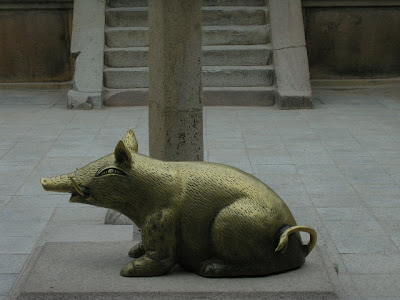 And there was a nice park around it:
And there was a nice park around it:
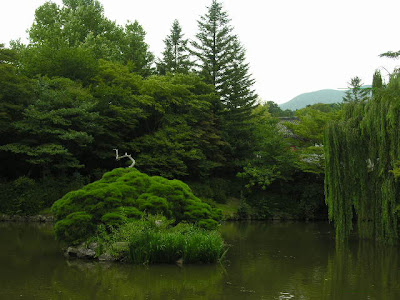 About 40 minutes away on foot, there was another small temple (Seokguram) with a very famous Buddha statue (no photo of that one, not allowed to take photos), and a beautiful view:
About 40 minutes away on foot, there was another small temple (Seokguram) with a very famous Buddha statue (no photo of that one, not allowed to take photos), and a beautiful view:
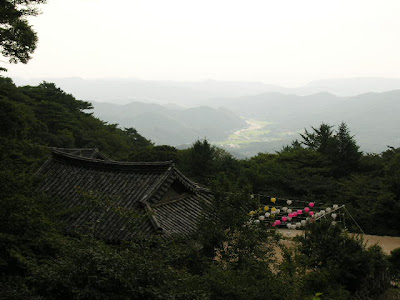
One day we visited Bulguksa temple. Now we have seen a lot of temples, but this was definitely my favourite one. There was this old stone pagoda:
I also found this unusual inhabitant in the temple:
Stop:
Eva,
KR - Gyeongju,
Temples
0
comments
Posted by
eva
21 August 2009
South Korea - Gangneung and around
After having spent a few days in Seoul (mainly to sort out our Chinese visas) we again escaped to the countryside. Gangneung is a small town, not much to see or do in the city itself, but we thought it would be a good base to explore the eastern coastal region. We checked into the usual motel (big bed, bid TV screen, big bathroom, but no computer this time) close to the bus station.
One day we took the train to visit nearby Jeongdongjin. It supposedly has the train station closest to the beach (in Korea? In Asia? In the world?). Anyway, it is very close. The village is not very interesting but has some oddities that make it worth a look: an American warship (gift from the USA to South Korea) and a North Korean submarine (that got stranded here and the crew had to flee) that we saw from the train, a huge hourglass that takes exactly one year to run through, and a huge cruiseship... on a hill!
 Who could have had this idea?
Who could have had this idea?
There was also a nice beach where we picknicked and went swimming.
Ah, another korean oddity: people don't wear swimming suits! But no, they don't go naked, but in their clothes! Jeans and all... I guess it's something to do with being very shy to show too much of their body or something. Most people don't seem to know how to swim anyway, so they just go into the shallow water. A group of students seemed quite impressed when Miguel jumped into the water and started swimming... Of course we didn't go in our clothes but in swimsuits, but I guess westerners are pardoned...
Another day we took a bus (actually, two buses) to Odaesan National Park. On the way there, we watched TV in one of the buses, a travel show about Zermatt! Was quite strange to see something so familiar on TV in such a different country.
In the national park we climbed the highest peak, called Birobong, 1563m. Koreans have built nice walking trails, but they are steep. When it gets too steep to build a path, they just build steps straight up the mountain! So you can imagine that there was quite a bit of sweating and panting included.... but a beautiful view from the top:
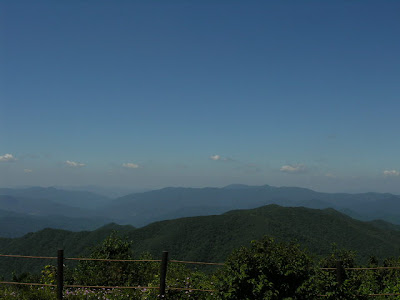
 The way down was also steep but not quite as much as the way up. We felt our out-of-shape legs after that!
The way down was also steep but not quite as much as the way up. We felt our out-of-shape legs after that!
The day after, we visited a huge cave near Samcheok, supposedly the biggest in Asia. It was very impressing, all the different stone formations were beautiful. Of course, every place had its own tacky name like "peak of desire" and "bridge of love", but hey, we're in Korea, they love that kind of thing here.
I didn't take pictures of the cave but Miguel might add one some time...
One day we took the train to visit nearby Jeongdongjin. It supposedly has the train station closest to the beach (in Korea? In Asia? In the world?). Anyway, it is very close. The village is not very interesting but has some oddities that make it worth a look: an American warship (gift from the USA to South Korea) and a North Korean submarine (that got stranded here and the crew had to flee) that we saw from the train, a huge hourglass that takes exactly one year to run through, and a huge cruiseship... on a hill!
There was also a nice beach where we picknicked and went swimming.
Ah, another korean oddity: people don't wear swimming suits! But no, they don't go naked, but in their clothes! Jeans and all... I guess it's something to do with being very shy to show too much of their body or something. Most people don't seem to know how to swim anyway, so they just go into the shallow water. A group of students seemed quite impressed when Miguel jumped into the water and started swimming... Of course we didn't go in our clothes but in swimsuits, but I guess westerners are pardoned...
Another day we took a bus (actually, two buses) to Odaesan National Park. On the way there, we watched TV in one of the buses, a travel show about Zermatt! Was quite strange to see something so familiar on TV in such a different country.
In the national park we climbed the highest peak, called Birobong, 1563m. Koreans have built nice walking trails, but they are steep. When it gets too steep to build a path, they just build steps straight up the mountain! So you can imagine that there was quite a bit of sweating and panting included.... but a beautiful view from the top:
The day after, we visited a huge cave near Samcheok, supposedly the biggest in Asia. It was very impressing, all the different stone formations were beautiful. Of course, every place had its own tacky name like "peak of desire" and "bridge of love", but hey, we're in Korea, they love that kind of thing here.
I didn't take pictures of the cave but Miguel might add one some time...
Stop:
Eva,
KR - Gangneung,
Sports
0
comments
Posted by
eva
Recent activity
Today we are fetching our Chinese visas and then heading to the Korean East coast. Weather is getting less humid and we hope to do so hiking and swim in the beach.
Stop:
Korea,
KR - Seoul,
Miguel
0
comments
Posted by
Miguel Anjo
20 August 2009
Alphabets
One of the things I'm enjoying on this trip is to learn new vocabulary in many languages, seeing the differences among languages and so on. But more interesting are the alphabets and so far in the trip we crossed the latin, cyrillic, both japanese katakana and hiragana and now the korean hangeul.
The latter one I specially like it. In a first look it seems like symbols, easy chinese symbols, but they are just a simple 24 letter alphabet. It is organized in syllabic blocks, each block having at least two letters. The creators were linguists from the 15th century and is still acclaimed to be one of the most intelligently made alphabets. It took to me about one day to memorize the letters and now after a week in Korea I can read slowly the words in the menu. More information about the hangeul in wikipedia.
Miguel Anjo or Мигэль Анжo or ミゲル安城 or 미겔 안조
The latter one I specially like it. In a first look it seems like symbols, easy chinese symbols, but they are just a simple 24 letter alphabet. It is organized in syllabic blocks, each block having at least two letters. The creators were linguists from the 15th century and is still acclaimed to be one of the most intelligently made alphabets. It took to me about one day to memorize the letters and now after a week in Korea I can read slowly the words in the menu. More information about the hangeul in wikipedia.
Miguel Anjo or Мигэль Анжo or ミゲル安城 or 미겔 안조
0
comments
Posted by
Miguel Anjo
18 August 2009
Korean technology at the service of the tourist - part II
This post has three pictures... One of them is not so related to tourists but in any case is related to technology.
Yes, Korea more or less means technology and big technology. All the time we see people watching television on their mobile phones while in the metro or in the bus. Kitchen fridges are like the american but maybe bigger. Our couchsurfing hosts here in Seoul had a 730 liters one! The washing machines are enormous, in Europe we would see them only in laundries. We pass by a shop the other day and the smallest one was meant for up to 9kg. They go mostly around 12, and the biggest was to fit it 17kg (they don't use bed sheets but rather synthetic blankets which they wash in the machine often).
But lets talk about the pictures:
 This is my mobile phone, which does not work in Korea as they use a different technology, but I keep it to put notes on it along the day. The thing hanging from it is... the "key-card" of the house of our couchsurfing hosts. Already in 2003 I was amazed that was possible to open the apartment of my friend Suzy here with a code or remote control. Now they can also use touchfree cards which at the same time can work as portable wallet and used to pay the public transport and small things in the convenience store.
This is my mobile phone, which does not work in Korea as they use a different technology, but I keep it to put notes on it along the day. The thing hanging from it is... the "key-card" of the house of our couchsurfing hosts. Already in 2003 I was amazed that was possible to open the apartment of my friend Suzy here with a code or remote control. Now they can also use touchfree cards which at the same time can work as portable wallet and used to pay the public transport and small things in the convenience store.
 This machine, which sell instruments for less than 6euros, was in the corridor of our motel in Gongju. The "instruments" we could not decipher so well what they were besides that they were sex toys and one of them was sold with batteries...
This machine, which sell instruments for less than 6euros, was in the corridor of our motel in Gongju. The "instruments" we could not decipher so well what they were besides that they were sex toys and one of them was sold with batteries...
 This picture shows the computer I'm using right now. It is our hotel room, which cost 50kW, around 28euros, a slightly higher than the budget price of 30-40kW they usually cost. But we are in the capital. The backpackers hostels are the same price and are full (but have kitchen and laundry).
This picture shows the computer I'm using right now. It is our hotel room, which cost 50kW, around 28euros, a slightly higher than the budget price of 30-40kW they usually cost. But we are in the capital. The backpackers hostels are the same price and are full (but have kitchen and laundry).
Ok, what we have here... From the left to the right, we can see a couple of bottles which includes hair gel, body cream, after-shave and balsam, hair brush, mosquito killer; hair-dryer; then the computer with a 19 or 21inch flat screen; then the remote control which controls both the lights, the television, the DVD player and the air-con; there is air-con; there is DVD player (and dozens of titles near to reception which one can take for free and mostly they are not porn!); TV of 1meter diagonal with home cinema (there are 4 speakers and subwoofer in the room!), fridge (with 3 free soft drinks), water (hot and cold) dispenser which we will use to make our morning coffees. There is also phone and the toilet has a shower with kind-of massage function. The bed is big one with typical Korean hard mattress (they are used to sleep on the floor).
For safety, and after checking with four guest-houses that were full and 4 others that were more expensive than here, we decided to follow the LP suggestion, which I link from GoogleBooks, and this is why we end up here.
Yes, Korea more or less means technology and big technology. All the time we see people watching television on their mobile phones while in the metro or in the bus. Kitchen fridges are like the american but maybe bigger. Our couchsurfing hosts here in Seoul had a 730 liters one! The washing machines are enormous, in Europe we would see them only in laundries. We pass by a shop the other day and the smallest one was meant for up to 9kg. They go mostly around 12, and the biggest was to fit it 17kg (they don't use bed sheets but rather synthetic blankets which they wash in the machine often).
But lets talk about the pictures:
 This is my mobile phone, which does not work in Korea as they use a different technology, but I keep it to put notes on it along the day. The thing hanging from it is... the "key-card" of the house of our couchsurfing hosts. Already in 2003 I was amazed that was possible to open the apartment of my friend Suzy here with a code or remote control. Now they can also use touchfree cards which at the same time can work as portable wallet and used to pay the public transport and small things in the convenience store.
This is my mobile phone, which does not work in Korea as they use a different technology, but I keep it to put notes on it along the day. The thing hanging from it is... the "key-card" of the house of our couchsurfing hosts. Already in 2003 I was amazed that was possible to open the apartment of my friend Suzy here with a code or remote control. Now they can also use touchfree cards which at the same time can work as portable wallet and used to pay the public transport and small things in the convenience store. This machine, which sell instruments for less than 6euros, was in the corridor of our motel in Gongju. The "instruments" we could not decipher so well what they were besides that they were sex toys and one of them was sold with batteries...
This machine, which sell instruments for less than 6euros, was in the corridor of our motel in Gongju. The "instruments" we could not decipher so well what they were besides that they were sex toys and one of them was sold with batteries... This picture shows the computer I'm using right now. It is our hotel room, which cost 50kW, around 28euros, a slightly higher than the budget price of 30-40kW they usually cost. But we are in the capital. The backpackers hostels are the same price and are full (but have kitchen and laundry).
This picture shows the computer I'm using right now. It is our hotel room, which cost 50kW, around 28euros, a slightly higher than the budget price of 30-40kW they usually cost. But we are in the capital. The backpackers hostels are the same price and are full (but have kitchen and laundry).Ok, what we have here... From the left to the right, we can see a couple of bottles which includes hair gel, body cream, after-shave and balsam, hair brush, mosquito killer; hair-dryer; then the computer with a 19 or 21inch flat screen; then the remote control which controls both the lights, the television, the DVD player and the air-con; there is air-con; there is DVD player (and dozens of titles near to reception which one can take for free and mostly they are not porn!); TV of 1meter diagonal with home cinema (there are 4 speakers and subwoofer in the room!), fridge (with 3 free soft drinks), water (hot and cold) dispenser which we will use to make our morning coffees. There is also phone and the toilet has a shower with kind-of massage function. The bed is big one with typical Korean hard mattress (they are used to sleep on the floor).
For safety, and after checking with four guest-houses that were full and 4 others that were more expensive than here, we decided to follow the LP suggestion, which I link from GoogleBooks, and this is why we end up here.
Stop:
Hotel rooms,
Korea,
Miguel
2
comments
Posted by
Miguel Anjo
Korean technology at the service of the tourist - part I
This post has just one bad picture of me, today, in an excellent museum in Seoul called Leeum Samsung Museum of Art. The entry price was expensive for Korean standards, 10kW (10'000Won) meaning a bit less than 6euros plus 2kW for audio guide.
This museum has two buildings done by known architects and it is two museums into one. A Traditional Korean Art and a Modern&Comtemporary Art Museum. With the best of the bests in the Traditional Korean Art part, showing very important archeological pieces found in Korean territory.
After entering into the building which is surrounded by contemporary art sculptures, after getting the ticket, leaving the backpack for free in wardrobe we go up to the 4th floor to visit it.
Here (and all around the museum), besides of all the labels in Korean, English and Japanese, with excellent light, we are using a PDA around the neck with a small phone on the ear and, as soon as we get close to an object it starts to tell about it, no need to touch anything. In the screen appears more pictures of details of the object, the same explanation and a bit more. We can also 'save' as favourites a selected number of objects.
 (me with a PDA/audioguide on the neck next metal miniature pagoda from the 11th century representing the existing Goryeo architecture of that time - which was in wood. It is the Korean National treasure 213)
(me with a PDA/audioguide on the neck next metal miniature pagoda from the 11th century representing the existing Goryeo architecture of that time - which was in wood. It is the Korean National treasure 213)
This was the second time we had an audio-guide. In Gongju, when visiting the tombs, we also got one for free with the ticket (which was merely 2kW, 1,3euros) which even had videos explaining more history about the tombs and the kings that were inside and so on. Just wonderful.
This museum has two buildings done by known architects and it is two museums into one. A Traditional Korean Art and a Modern&Comtemporary Art Museum. With the best of the bests in the Traditional Korean Art part, showing very important archeological pieces found in Korean territory.
After entering into the building which is surrounded by contemporary art sculptures, after getting the ticket, leaving the backpack for free in wardrobe we go up to the 4th floor to visit it.
Here (and all around the museum), besides of all the labels in Korean, English and Japanese, with excellent light, we are using a PDA around the neck with a small phone on the ear and, as soon as we get close to an object it starts to tell about it, no need to touch anything. In the screen appears more pictures of details of the object, the same explanation and a bit more. We can also 'save' as favourites a selected number of objects.
 (me with a PDA/audioguide on the neck next metal miniature pagoda from the 11th century representing the existing Goryeo architecture of that time - which was in wood. It is the Korean National treasure 213)
(me with a PDA/audioguide on the neck next metal miniature pagoda from the 11th century representing the existing Goryeo architecture of that time - which was in wood. It is the Korean National treasure 213)This was the second time we had an audio-guide. In Gongju, when visiting the tombs, we also got one for free with the ticket (which was merely 2kW, 1,3euros) which even had videos explaining more history about the tombs and the kings that were inside and so on. Just wonderful.
Stop:
Korea,
KR - Seoul,
Miguel
0
comments
Posted by
Miguel Anjo
13 August 2009
South Korea - Gonju
We chose Gonju because it's a small town, and there seemed to be enough things to do for a few days. We felt the need to stay longer at the same place and also relax a bit.
This time we decided to choose a motel from our guidebook, and it was a good choice. Friendly landlady, clean room, air-conditioning (it's a bit noisy but ok), computer with internet in each room.
On the first day we checked out the tourist information, where we got the usual tourist map of the city, which is absolutely not up to scale but shows the major sights. We then went to see the fortress, but the heat kept our motivation in certain limits. There were quite a lot of local elderly people sitting and lying around, chatting and sleeping, and a woman offered us pieces of watermelon. And there were some beautiful details in the temples:
We then went to visit the royal tombs, which are incredibly old and whose discovery have been very important to Korean historians. You can't actually visit the tombs (they're closed for protection) but a well done museum has exact replicas and shows what was found inside them. We got an audioguide - usually I'm a bit suspicious of audioguides, but this one was good, if you didn't mind the infantile way it was presented (a comic figure - a dog? - talking with a very american accent). There was a lot of interesting information about history.
Of the original tombs, all you can see are the typical mounds of earth, that one can see all over Korea.
 The day after we visited again a temple - we actually went there because there was supposed to be a swimming pool, which turned out to be very small and shallow and very expensive, so we went to visit Magoksa temple, very beautiful and not as extensively renovated as most others. I especially liked some of the paintings.
The day after we visited again a temple - we actually went there because there was supposed to be a swimming pool, which turned out to be very small and shallow and very expensive, so we went to visit Magoksa temple, very beautiful and not as extensively renovated as most others. I especially liked some of the paintings.
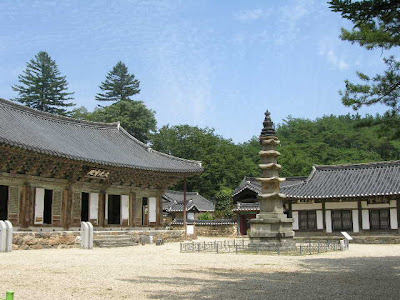
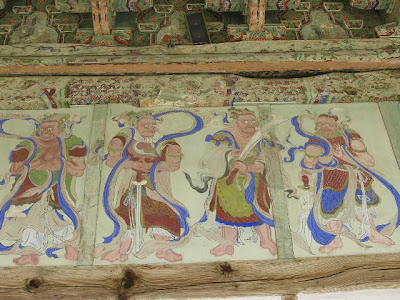 From there we went on a hike - only 2 hours but very steep and tiring, even more so because of the everlasting heat and humidity. We made it to the top anyway.
From there we went on a hike - only 2 hours but very steep and tiring, even more so because of the everlasting heat and humidity. We made it to the top anyway.
 The hike was followed by a nice bath in a cool river!
The hike was followed by a nice bath in a cool river!
During the rest of the time, we relaxed, enjoyed the small-town Korea, and yes, spent some time in front of "our" computer.... ;-)
A few impressions:
A small street in which every house is a shop (although it might not be obvious from outside what they're actually selling): Managing the difficult task to eat dumplings with chopsticks:
Managing the difficult task to eat dumplings with chopsticks: Enjoying the colours and unusual smells and sights at the local market:
Enjoying the colours and unusual smells and sights at the local market:
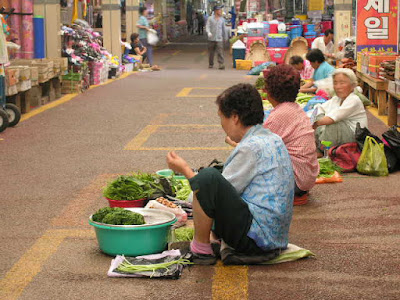
Eating some bibimbap with about a dozen side dishes (mostly spicy):
 So, this is my impression of Korea after one week: temples, a lot of history and kings, heat and humidity, nice but spicy food, people wanting to help in restaurants and bus stations, great opportunities for hiking, many new smells and tastes, a good place to relax and take things easy.
So, this is my impression of Korea after one week: temples, a lot of history and kings, heat and humidity, nice but spicy food, people wanting to help in restaurants and bus stations, great opportunities for hiking, many new smells and tastes, a good place to relax and take things easy.
Tomorrow we're off to another big city - Seoul. Let's see what it holds for us.
This time we decided to choose a motel from our guidebook, and it was a good choice. Friendly landlady, clean room, air-conditioning (it's a bit noisy but ok), computer with internet in each room.
On the first day we checked out the tourist information, where we got the usual tourist map of the city, which is absolutely not up to scale but shows the major sights. We then went to see the fortress, but the heat kept our motivation in certain limits. There were quite a lot of local elderly people sitting and lying around, chatting and sleeping, and a woman offered us pieces of watermelon. And there were some beautiful details in the temples:

We then went to visit the royal tombs, which are incredibly old and whose discovery have been very important to Korean historians. You can't actually visit the tombs (they're closed for protection) but a well done museum has exact replicas and shows what was found inside them. We got an audioguide - usually I'm a bit suspicious of audioguides, but this one was good, if you didn't mind the infantile way it was presented (a comic figure - a dog? - talking with a very american accent). There was a lot of interesting information about history.
Of the original tombs, all you can see are the typical mounds of earth, that one can see all over Korea.
 The day after we visited again a temple - we actually went there because there was supposed to be a swimming pool, which turned out to be very small and shallow and very expensive, so we went to visit Magoksa temple, very beautiful and not as extensively renovated as most others. I especially liked some of the paintings.
The day after we visited again a temple - we actually went there because there was supposed to be a swimming pool, which turned out to be very small and shallow and very expensive, so we went to visit Magoksa temple, very beautiful and not as extensively renovated as most others. I especially liked some of the paintings.During the rest of the time, we relaxed, enjoyed the small-town Korea, and yes, spent some time in front of "our" computer.... ;-)
A few impressions:
A small street in which every house is a shop (although it might not be obvious from outside what they're actually selling):
 Managing the difficult task to eat dumplings with chopsticks:
Managing the difficult task to eat dumplings with chopsticks: Enjoying the colours and unusual smells and sights at the local market:
Enjoying the colours and unusual smells and sights at the local market:Eating some bibimbap with about a dozen side dishes (mostly spicy):
Tomorrow we're off to another big city - Seoul. Let's see what it holds for us.
Stop:
Eva,
Food,
Korea,
KR - Gonju,
Sports
0
comments
Posted by
eva
10 August 2009
South Korea - Busan and Jinju
We left Japan on the 7th of August, by ferry. Buying tickets at the Fukuoka ferry terminal was quite straightforward, except that we didn't have enough cash anymore to pay the fuel surcharge which could not be paid by credit card, so we had to walk to the next Post Office to get some cash.
The ferry was nice, economy class was separated into several tatami rooms (actually, not really tatami but carpet). We shared our compartment with a mother with her little girl who kept wrapping up her Snoopy into pieces of cloth, a buddhist woman, a young korean woman, and an elderly man (japanese I believe) who first commented on our Japanese boxed lunches, then kept on talking to himself before falling asleep and snoring basically all the way to Busan. When he woke up he went on talking to himself a bit, got up, farted with a lot of noise and smell, and went to smoke.
Miguel has already written about the events at arrival which kept us there for about an hour. It was already dark when we made it into the center, but finding a motel room is never a problem here.
The next day was very hot so we thought it would be nice to go to one of the beaches. Our guidebook said that Haeundae Beach was crowded but we had to see it by ourselves. Well, it was crowded. Almost no space between the umbrellas, and hundreds of people in the water, mostly using these yellow inflatable rings. Forget about swimming, but the water was too shallow anyway and the coastguards wouldn't let anyone go very far anyway (my theory for the moment is that a lot of people here don't know how to swim, but I might be wrong...).
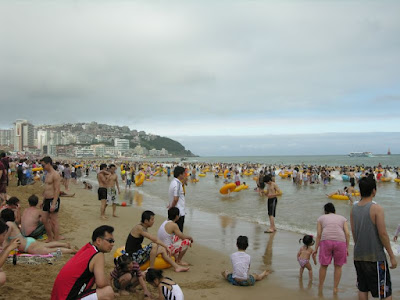 So, no swimming this time.
So, no swimming this time.
The next day we went to visit a temple and hiked along a fortress (basically a long wall on a few hills that long ago served to hold back the invading Japanese). After a steep climb we arrived on top, and from there it was a nice walk, although there was a lot of wind and fog, but this also made for a special atmosphere with all the green foliage.
 Being a bit tired of big cities we went on to Jinju where we visited the fortress, one of the more important ones in Korea. It contains several temples and buildings and a museum (that was closed), all surrounded by a wall. We enjoyed the colourful temples but it was very hot and sticky, so we also spent a certain amount of time in shops (air-conditioned, of course).
Being a bit tired of big cities we went on to Jinju where we visited the fortress, one of the more important ones in Korea. It contains several temples and buildings and a museum (that was closed), all surrounded by a wall. We enjoyed the colourful temples but it was very hot and sticky, so we also spent a certain amount of time in shops (air-conditioned, of course).

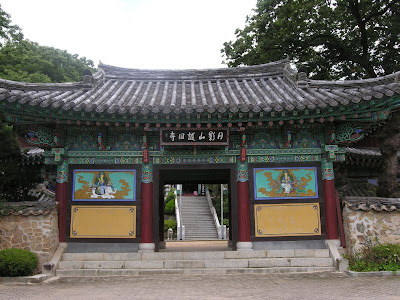 We also had incredibly spicy chicken which made us sweat and cry (and have you ever had to eat bony chicken pieces like wings with chopsticks? You're not supposed to use your hands to touch food in Korea....). Our stomachs started to fell the always spicy food....
We also had incredibly spicy chicken which made us sweat and cry (and have you ever had to eat bony chicken pieces like wings with chopsticks? You're not supposed to use your hands to touch food in Korea....). Our stomachs started to fell the always spicy food....
The ferry was nice, economy class was separated into several tatami rooms (actually, not really tatami but carpet). We shared our compartment with a mother with her little girl who kept wrapping up her Snoopy into pieces of cloth, a buddhist woman, a young korean woman, and an elderly man (japanese I believe) who first commented on our Japanese boxed lunches, then kept on talking to himself before falling asleep and snoring basically all the way to Busan. When he woke up he went on talking to himself a bit, got up, farted with a lot of noise and smell, and went to smoke.
Miguel has already written about the events at arrival which kept us there for about an hour. It was already dark when we made it into the center, but finding a motel room is never a problem here.
The next day was very hot so we thought it would be nice to go to one of the beaches. Our guidebook said that Haeundae Beach was crowded but we had to see it by ourselves. Well, it was crowded. Almost no space between the umbrellas, and hundreds of people in the water, mostly using these yellow inflatable rings. Forget about swimming, but the water was too shallow anyway and the coastguards wouldn't let anyone go very far anyway (my theory for the moment is that a lot of people here don't know how to swim, but I might be wrong...).

 So, no swimming this time.
So, no swimming this time.The next day we went to visit a temple and hiked along a fortress (basically a long wall on a few hills that long ago served to hold back the invading Japanese). After a steep climb we arrived on top, and from there it was a nice walk, although there was a lot of wind and fog, but this also made for a special atmosphere with all the green foliage.
 Being a bit tired of big cities we went on to Jinju where we visited the fortress, one of the more important ones in Korea. It contains several temples and buildings and a museum (that was closed), all surrounded by a wall. We enjoyed the colourful temples but it was very hot and sticky, so we also spent a certain amount of time in shops (air-conditioned, of course).
Being a bit tired of big cities we went on to Jinju where we visited the fortress, one of the more important ones in Korea. It contains several temples and buildings and a museum (that was closed), all surrounded by a wall. We enjoyed the colourful temples but it was very hot and sticky, so we also spent a certain amount of time in shops (air-conditioned, of course).
 We also had incredibly spicy chicken which made us sweat and cry (and have you ever had to eat bony chicken pieces like wings with chopsticks? You're not supposed to use your hands to touch food in Korea....). Our stomachs started to fell the always spicy food....
We also had incredibly spicy chicken which made us sweat and cry (and have you ever had to eat bony chicken pieces like wings with chopsticks? You're not supposed to use your hands to touch food in Korea....). Our stomachs started to fell the always spicy food....
Stop:
Eva,
Korea,
KR - Busan,
KR - Jinju
0
comments
Posted by
eva
Toilet paper machine
We did not take pictures of the noodles machine, or french fries or books or vibrators (in the motel), but here a picture of a toilet paper machine, found in many subway stations toilets in Busan, South Korea.


Stop:
Korea,
KR - Busan,
Miguel
0
comments
Posted by
Miguel Anjo
09 August 2009
Korea, first toughts
Well, Korea is definitely a easy country to travel, quite recommended. Come soon as the roads and over-density is taking care of making it less appealing. While Korea has a different alphabet (not signs), many things are written in english. Hotels - or better, love motels - are easy to find, they use the same sign that in Japan is used for hot springs. The mattresses are very hard but the rooms are clean and adventurous (like our last with a round bed, this one with a half naked women in the door key). Transportation is mostly bus, very frequent, meaning about every 10/15 minutes between any two cities (yes, that often). It is quite cheap for europeans, room less than 25euros (for 2), meals less than 10euros plus drinks (beer is 2euros).
Particularities of Korea is that all their food is spicy (ok, 90%), but since my first visit in 2003, I see that now is much easier to find western food and bakeries (and chocolate instead of beans in the croissants); there are many, many shops. They are crazy about hiking and there are dozens of shops specialized in hiking (what we dreamed of it in Russia), many marked trails (but distances and maps still to improve).
On our first days here young people (<30) always start to talk with us, couple of times in the restaurant to recommend what to eat, translate the menu, help with the traditional way of eating something. This completely spontaneously. Their english is reasonable and their will to talk is great.
Particularities of Korea is that all their food is spicy (ok, 90%), but since my first visit in 2003, I see that now is much easier to find western food and bakeries (and chocolate instead of beans in the croissants); there are many, many shops. They are crazy about hiking and there are dozens of shops specialized in hiking (what we dreamed of it in Russia), many marked trails (but distances and maps still to improve).
On our first days here young people (<30) always start to talk with us, couple of times in the restaurant to recommend what to eat, translate the menu, help with the traditional way of eating something. This completely spontaneously. Their english is reasonable and their will to talk is great.
2
comments
Posted by
Miguel Anjo
07 August 2009
Day when they discovered the wrong birthdate in my old passport
Result was more than one hour in the customs office (was only 2 minutes before I was sent there, to the 'interview' room).
Well, the story goes that, back in 1997, I was 17 by then, as Portuguese I needed a visa to go to the United States. My parents and friends decided to go to Hawaii to run the marathon (my family often has this excuse for traveling) so I needed a passport (old was expired) and there was not much time and we requested a urgent one. It come after 3 days with the birth year of 1972, which is 7 years before than the correct year. At US embassy, because I was "25" years old they gave me a 10-years visa, which was great (compared to 3 months one if I would have 17 years old).
No problems traveling back and forth all around the world during 10-years always being much older in the passport than in reality. This beloved passport I had to give back two years ago when it was about to expired and I needed a new one. Here when I cried about it.
I even came in 2003 to South Korea and I was here when there was the London bombing, flying next day to Sydney. In the airport, that day, they asked me a second identification and I gave my "Swiss card" but fortunately the australian officer did not spot the mismatch of the dates.
But today, here comes finally the story you are waiting for, the officer in the immigration at Busan port found strange that I did not wrote in the "Adress in Korea" field of the immigration card (lesson learned - always fill, even if with bullshit, as Eva did afterwards). I told him I did not know where I was going to stay. He asks if it was the first time in Korea and I think if to stay yes or no. In Russia I said "yes, first time in Russia" (I was there with the old passport also) and was fine. Here I said "No". "When?", "Around 2002/3". He searches on the computer for my name and the year and there it is BUT... the birthdate does not match. "Why?", "Don't know", I say. "Boss!". And here I go to the "interview" labeled room.
On an old sofa I try to keep calm. On my way there I told quickly Eva what the problem was, she goes to the immigration office and "enters" Korea and then waits. First boss is some guy waiting for getting retired and took some minutes before he decided to close internet explorer and reading the news to take care of me. Try to use the computer to find the same information about my previous stay but he is not skilled enough to do so. He goes to ask the immigration officer that spot me and then comes with another boss. This one grasps some more english and has more computers skills. I kept saying I did not know the reason for it until they showed me the scan of the 2003 immigration card, signed by me, where I stated with my horrible hand writing that I was born in 1972. Glup. "Why?" he asks... Silence from me... Seeing things not going further and more people looking through my passport against light to see any sign of falsification (fortunately it is the electronic one, very new, difficult to falsify, but they did not have even machine of ultra-violet to see the contrasts), I decided to tell the true - "I remember now...". Meanwhile I showed my Half-tarif card from the Swiss trains, which had my birth date.
He goes back to another computer, checks, re-checks. Comes with an officer speaking more english. I explain all the story, "I was 18 at the time... is world of a mess re-doing a passport... it is expired anyway... I can show a scan of my portuguese id on the internet". I found I had my driving license in the backpack and also gave and showed. I think this helped. "The girl outside is your girlfriend? Are you travelling together?". They also asked Eva's passport then. The english speaking officer translates all I say. The boss says "I don't know what to do with you, you see, dates do not match...", "but the other passport is expired", I reply.
At this point I had understood that they only had the information about my stay in Korea, my old passport information but not its expiring date. No information about any other country traveled with any of the passports. If it there was no scan of my previous immigration card filled and signed by me I could say that its a coincidence of someone else with my name, but even...
He goes back to the computer outside the room and the "waiting-to-be-retired guy" says "Go. You enter Korea. Take baggage and leave.".
I go out to the smarter boss on his computer and he writes, writes, asks again my driving license, my swiss trains card, asks another guy to make photocopy of everything. Now Eva was also with me and we kept talking an laughing in French. He asks "where you staying?", "I don't..." but Eva interrupts and says "Blue backpackers hostel" and picks the paper from him and writes down on my immigration card. Then takes out the guidebook and shows him the name and description. It was the only name she remembered. The boss writes more and more on his computer, I believe on my file and also on Eva's file.
Meanwhile another boat has arrived, all people went trough and officers leave to home. The "interview" room is already closed as well. This boss also wants to go home. Stamp on the passport and "please go".
Still to make customs check. "Why you took so long?" he asks Eva. "Problem with passport?" asks me. "With old passport", I said. But is mind was already driving home and just did not care and let us go.
Tourist information was already closed, taxi driver tries to take us but we refuse and we go to find the metro. We decided to give a chance to the Blue backpackers hostel but only dormitory was available so we end up in a motel with round bed, dim light option, free condom and kitch furniture for a want-to-be princess kind of person. Welcome to Korea.
Well, the story goes that, back in 1997, I was 17 by then, as Portuguese I needed a visa to go to the United States. My parents and friends decided to go to Hawaii to run the marathon (my family often has this excuse for traveling) so I needed a passport (old was expired) and there was not much time and we requested a urgent one. It come after 3 days with the birth year of 1972, which is 7 years before than the correct year. At US embassy, because I was "25" years old they gave me a 10-years visa, which was great (compared to 3 months one if I would have 17 years old).
No problems traveling back and forth all around the world during 10-years always being much older in the passport than in reality. This beloved passport I had to give back two years ago when it was about to expired and I needed a new one. Here when I cried about it.
I even came in 2003 to South Korea and I was here when there was the London bombing, flying next day to Sydney. In the airport, that day, they asked me a second identification and I gave my "Swiss card" but fortunately the australian officer did not spot the mismatch of the dates.
But today, here comes finally the story you are waiting for, the officer in the immigration at Busan port found strange that I did not wrote in the "Adress in Korea" field of the immigration card (lesson learned - always fill, even if with bullshit, as Eva did afterwards). I told him I did not know where I was going to stay. He asks if it was the first time in Korea and I think if to stay yes or no. In Russia I said "yes, first time in Russia" (I was there with the old passport also) and was fine. Here I said "No". "When?", "Around 2002/3". He searches on the computer for my name and the year and there it is BUT... the birthdate does not match. "Why?", "Don't know", I say. "Boss!". And here I go to the "interview" labeled room.
On an old sofa I try to keep calm. On my way there I told quickly Eva what the problem was, she goes to the immigration office and "enters" Korea and then waits. First boss is some guy waiting for getting retired and took some minutes before he decided to close internet explorer and reading the news to take care of me. Try to use the computer to find the same information about my previous stay but he is not skilled enough to do so. He goes to ask the immigration officer that spot me and then comes with another boss. This one grasps some more english and has more computers skills. I kept saying I did not know the reason for it until they showed me the scan of the 2003 immigration card, signed by me, where I stated with my horrible hand writing that I was born in 1972. Glup. "Why?" he asks... Silence from me... Seeing things not going further and more people looking through my passport against light to see any sign of falsification (fortunately it is the electronic one, very new, difficult to falsify, but they did not have even machine of ultra-violet to see the contrasts), I decided to tell the true - "I remember now...". Meanwhile I showed my Half-tarif card from the Swiss trains, which had my birth date.
He goes back to another computer, checks, re-checks. Comes with an officer speaking more english. I explain all the story, "I was 18 at the time... is world of a mess re-doing a passport... it is expired anyway... I can show a scan of my portuguese id on the internet". I found I had my driving license in the backpack and also gave and showed. I think this helped. "The girl outside is your girlfriend? Are you travelling together?". They also asked Eva's passport then. The english speaking officer translates all I say. The boss says "I don't know what to do with you, you see, dates do not match...", "but the other passport is expired", I reply.
At this point I had understood that they only had the information about my stay in Korea, my old passport information but not its expiring date. No information about any other country traveled with any of the passports. If it there was no scan of my previous immigration card filled and signed by me I could say that its a coincidence of someone else with my name, but even...
He goes back to the computer outside the room and the "waiting-to-be-retired guy" says "Go. You enter Korea. Take baggage and leave.".
I go out to the smarter boss on his computer and he writes, writes, asks again my driving license, my swiss trains card, asks another guy to make photocopy of everything. Now Eva was also with me and we kept talking an laughing in French. He asks "where you staying?", "I don't..." but Eva interrupts and says "Blue backpackers hostel" and picks the paper from him and writes down on my immigration card. Then takes out the guidebook and shows him the name and description. It was the only name she remembered. The boss writes more and more on his computer, I believe on my file and also on Eva's file.
Meanwhile another boat has arrived, all people went trough and officers leave to home. The "interview" room is already closed as well. This boss also wants to go home. Stamp on the passport and "please go".
Still to make customs check. "Why you took so long?" he asks Eva. "Problem with passport?" asks me. "With old passport", I said. But is mind was already driving home and just did not care and let us go.
Tourist information was already closed, taxi driver tries to take us but we refuse and we go to find the metro. We decided to give a chance to the Blue backpackers hostel but only dormitory was available so we end up in a motel with round bed, dim light option, free condom and kitch furniture for a want-to-be princess kind of person. Welcome to Korea.
Stop:
Korea,
KR - Busan,
Miguel
2
comments
Posted by
Miguel Anjo
About Japan
Things I like in Japan
+ It is an organized country
+ Public transport is frequent, reliable and take us everywhere
+Tourist offices exist in every train station, have maps and help with accomodation
+ Public baths and onsens are relaxing
+ Tatami floor in the room is very comfortable with japanese futons and pillows
+ Set menus and boxed lunches are helpfull in restaurant and practical for travelling
What I dislike in Japan
-Water is ofter served with ice
- No bike paths in the cities
- Very expensive country
- Too much garbage when buying in the supermarket / convenience stores
- Very humid in the summer
+ It is an organized country
+ Public transport is frequent, reliable and take us everywhere
+Tourist offices exist in every train station, have maps and help with accomodation
+ Public baths and onsens are relaxing
+ Tatami floor in the room is very comfortable with japanese futons and pillows
+ Set menus and boxed lunches are helpfull in restaurant and practical for travelling
What I dislike in Japan
-Water is ofter served with ice
- No bike paths in the cities
- Very expensive country
- Too much garbage when buying in the supermarket / convenience stores
- Very humid in the summer
0
comments
Posted by
Miguel Anjo
Through Japan towards the South
The idea behind travelling through Japan and South Korea was to arrive to China by land, and getting a visa on the way there. Apart from that, it also gave us a break from travelling in more "difficult" countries like Russia and China, the side effect being our budget jumping up to the sky.
From Wakkanai, we took a train to Sapporo, a city we had already visited two years ago and liked a lot. On the day we arrived, the city held fireworks by the river (almost in time for 1st of August!).
 We also went on another cycling trip along the river on small Japanese bikes to visit a sculpture park outside the city.
We also went on another cycling trip along the river on small Japanese bikes to visit a sculpture park outside the city.
From Sapporo we took the Twilight Express to Kyoto, a 20-hour train journey. We were amazed by our compartment, just for the 2 of us, with one of the beds converted to comfortable seats during the day. Of course we couldn't help comparing with Russian trains, and the samovar with hot water was definitely missing, as was the handtowel and cheap food sold on the train and on platforms.
We got off in Kyoto and were hit immediately by the heat and humidity, which made sightseeing very tiring. We still managed to see a few temples (although some of them are really overrun by tourists and full of souvenir shops) and of course eat some nice food.
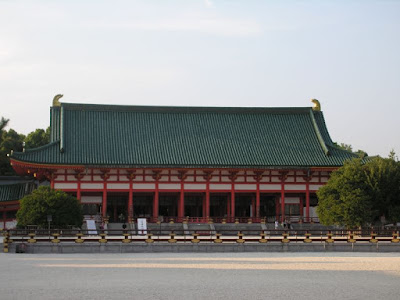 From Kyoto we then took a Nozomi train (the super-fast bullet train) to Fukuoka, from where we planned to take the ferry to South Korea. Fukuoka was just as hot and humid, and unfortunately we chose one of the cheapest hotels which was not as nice as others we had experienced (and we had to pay for the air-conditioning).
From Kyoto we then took a Nozomi train (the super-fast bullet train) to Fukuoka, from where we planned to take the ferry to South Korea. Fukuoka was just as hot and humid, and unfortunately we chose one of the cheapest hotels which was not as nice as others we had experienced (and we had to pay for the air-conditioning).
One evening we went to eat at a Yakitori Restaurant, where everything is grilled in front of the counter where people sit, which makes for quite an amusing entertainment while you're eating.
 We left Japan on the 7th of August on a ferry to South Korea, a new country for me and reviving old memories for Miguel.
We left Japan on the 7th of August on a ferry to South Korea, a new country for me and reviving old memories for Miguel.
From Wakkanai, we took a train to Sapporo, a city we had already visited two years ago and liked a lot. On the day we arrived, the city held fireworks by the river (almost in time for 1st of August!).
 We also went on another cycling trip along the river on small Japanese bikes to visit a sculpture park outside the city.
We also went on another cycling trip along the river on small Japanese bikes to visit a sculpture park outside the city.From Sapporo we took the Twilight Express to Kyoto, a 20-hour train journey. We were amazed by our compartment, just for the 2 of us, with one of the beds converted to comfortable seats during the day. Of course we couldn't help comparing with Russian trains, and the samovar with hot water was definitely missing, as was the handtowel and cheap food sold on the train and on platforms.
We got off in Kyoto and were hit immediately by the heat and humidity, which made sightseeing very tiring. We still managed to see a few temples (although some of them are really overrun by tourists and full of souvenir shops) and of course eat some nice food.
 From Kyoto we then took a Nozomi train (the super-fast bullet train) to Fukuoka, from where we planned to take the ferry to South Korea. Fukuoka was just as hot and humid, and unfortunately we chose one of the cheapest hotels which was not as nice as others we had experienced (and we had to pay for the air-conditioning).
From Kyoto we then took a Nozomi train (the super-fast bullet train) to Fukuoka, from where we planned to take the ferry to South Korea. Fukuoka was just as hot and humid, and unfortunately we chose one of the cheapest hotels which was not as nice as others we had experienced (and we had to pay for the air-conditioning).One evening we went to eat at a Yakitori Restaurant, where everything is grilled in front of the counter where people sit, which makes for quite an amusing entertainment while you're eating.
 We left Japan on the 7th of August on a ferry to South Korea, a new country for me and reviving old memories for Miguel.
We left Japan on the 7th of August on a ferry to South Korea, a new country for me and reviving old memories for Miguel.
Stop:
Eva,
Japan,
JP - Kyoto,
JP - Sapporo
0
comments
Posted by
eva
06 August 2009
Japanese trains
This time in Japan we took only three trains. We did not have Japan Rail Pass, which is a must if you want to go around Japan, as trains are expensive like in Switzerland. Unfortunately in Russia you can only get this rail pass in Moscow and we were a bit far away from it. You cannot get it in Japan.
1) From Wakkanai to Sapporo - a simple diesel train with the omnipresent seats that you can put in the direction of the train. It was a 5 hour ride for 60euros/person.
 2) From Sapporo to Kyoto - The Twilight Express night train bound to Osaka. Pulled by two diesel locomotives (at least in Hokkaido), had several classes, going from the queen size bedroom with huge LCD to a 4-berth compartments where you have individual curtains to increase your privacy.
2) From Sapporo to Kyoto - The Twilight Express night train bound to Osaka. Pulled by two diesel locomotives (at least in Hokkaido), had several classes, going from the queen size bedroom with huge LCD to a 4-berth compartments where you have individual curtains to increase your privacy. 
We were in a 2-berth compartment for which we paid around 200euros/person for the 20hour ride. There was a gourmet restaurant, a wagon as living room, couple of drink machines and two showers. The Japanese trains are nice but lacking some features of the Russian trains - there is no towel included in the pack; it misses small shelf to put your small belongings; there was no timetable posted to see where big stops would be; there was no way to turn off the never-ending announcements in japanese that started at 6am; there was no samovar with hot water to do coffee (and, being Japan, there should have been also a microwave); there was still a - almost empty - smokers wagon of 4-berth compartments, while the rest was full.
There was a gourmet restaurant, a wagon as living room, couple of drink machines and two showers. The Japanese trains are nice but lacking some features of the Russian trains - there is no towel included in the pack; it misses small shelf to put your small belongings; there was no timetable posted to see where big stops would be; there was no way to turn off the never-ending announcements in japanese that started at 6am; there was no samovar with hot water to do coffee (and, being Japan, there should have been also a microwave); there was still a - almost empty - smokers wagon of 4-berth compartments, while the rest was full.

3) From Kyoto to Hakata (Fukuoka) - the state of the art from the Shinkansen trains, the so called Nozomi N700 which goes up to 300km/hour. It took three hours to do 500km. It was completely full in the non-reserved wagons, but after Osaka we got a seat. Inside it is 3 seats on left and 2 on the right side of the train. There is a smokers compartment in one of the wagons and also drinks machines somewhere. It was 120euros/person.

1) From Wakkanai to Sapporo - a simple diesel train with the omnipresent seats that you can put in the direction of the train. It was a 5 hour ride for 60euros/person.
 2) From Sapporo to Kyoto - The Twilight Express night train bound to Osaka. Pulled by two diesel locomotives (at least in Hokkaido), had several classes, going from the queen size bedroom with huge LCD to a 4-berth compartments where you have individual curtains to increase your privacy.
2) From Sapporo to Kyoto - The Twilight Express night train bound to Osaka. Pulled by two diesel locomotives (at least in Hokkaido), had several classes, going from the queen size bedroom with huge LCD to a 4-berth compartments where you have individual curtains to increase your privacy. 
We were in a 2-berth compartment for which we paid around 200euros/person for the 20hour ride.
 There was a gourmet restaurant, a wagon as living room, couple of drink machines and two showers. The Japanese trains are nice but lacking some features of the Russian trains - there is no towel included in the pack; it misses small shelf to put your small belongings; there was no timetable posted to see where big stops would be; there was no way to turn off the never-ending announcements in japanese that started at 6am; there was no samovar with hot water to do coffee (and, being Japan, there should have been also a microwave); there was still a - almost empty - smokers wagon of 4-berth compartments, while the rest was full.
There was a gourmet restaurant, a wagon as living room, couple of drink machines and two showers. The Japanese trains are nice but lacking some features of the Russian trains - there is no towel included in the pack; it misses small shelf to put your small belongings; there was no timetable posted to see where big stops would be; there was no way to turn off the never-ending announcements in japanese that started at 6am; there was no samovar with hot water to do coffee (and, being Japan, there should have been also a microwave); there was still a - almost empty - smokers wagon of 4-berth compartments, while the rest was full.
3) From Kyoto to Hakata (Fukuoka) - the state of the art from the Shinkansen trains, the so called Nozomi N700 which goes up to 300km/hour. It took three hours to do 500km. It was completely full in the non-reserved wagons, but after Osaka we got a seat. Inside it is 3 seats on left and 2 on the right side of the train. There is a smokers compartment in one of the wagons and also drinks machines somewhere. It was 120euros/person.

0
comments
Posted by
Miguel Anjo
04 August 2009
Japan - hot and humid
Travel in Japan has its rules. The heat can be unbearable; the tourists - among japanese, coreans and westerns - can be too many. The magic of Japan can stay hidden in those conditions. Hokkaido continues to be my special Japan. Cooler and few tourists, mountains and hiking. But I believe that I should discover Japan in another time of the year, with better conditions. Does it exist?
We are now in Kyoto, the tourist and temple centre of Japan. Its 35 very humid degrees outside and inside only bearable with air-con. Tomorrow we will take the bullet shinkansen to Fukuoka, one of the best living cities of Japan, following my readings. I hope it compares to Sapporo/Hokkaido, which is still my top city in Japan.
We are now in Kyoto, the tourist and temple centre of Japan. Its 35 very humid degrees outside and inside only bearable with air-con. Tomorrow we will take the bullet shinkansen to Fukuoka, one of the best living cities of Japan, following my readings. I hope it compares to Sapporo/Hokkaido, which is still my top city in Japan.
Stop:
Japan,
JP - Kyoto,
Miguel
0
comments
Posted by
Miguel Anjo
01 August 2009
Four months of travelling - a review
Four months away with just a small backpack. Here`s a quick review...
- Vienna: a sunny start in a great city, feeling very much at home at Jan`s place. First sunburn of the season during our cycling trip to Bratislava.
- Budapest: It was hot and we were tired from the night train and sleeping on a hard couch. Need to visit it again.
- Poland: VERY positive. The sunny weather helped (it rained only once for about an hour). Hospitable people, cheap transport, beautiful nature, great hiking and biking trails (thanks to PTTK, the polish nature lovers association). Greatly recommended.
- Baltic States: We could have stayed longer but it was cold and rainy. We should go back and see more of the countryside. Tallinn is beautiful!
- "European" Russia: In through the back door, on foot over the bridge to Ivangorod, to be recommended. St Petersburg: very beautiful but too big for my taste. Moscow: Just too big. On the train to Lake Baikal: Less interesting towns but very hospitable people! Thanks couchsurfing.
- Siberia: Huge forests, never ending hills. Lake Baikal with beautiful beaches. Ulan-Ude, the town where we relaxed. Volunteering project in Buryatia: a unique experience, remote villages, beautiful nature. BAM railway: small soviet towns, talking to locals on trains.
- Sakhalin: the not-so-difficult-as-expected ferry ride from Vanino. Getting the oh-so-expensive ferry tickets for Japan. Finding the port only due to the help of a local who worked at the port.
- Leaving Russia: Out through the back door. Very easy, very recommended. No questions, no baggage checks.
- Arriving in Japan: Perfectionism come true. Washing off all that grub in a local public bath, sleeping soundly on a futon. Too perfect?...
What`s next? A long-distance train to Kyoto. A ferry to Korea. Then, we will see...
- Vienna: a sunny start in a great city, feeling very much at home at Jan`s place. First sunburn of the season during our cycling trip to Bratislava.
- Budapest: It was hot and we were tired from the night train and sleeping on a hard couch. Need to visit it again.
- Poland: VERY positive. The sunny weather helped (it rained only once for about an hour). Hospitable people, cheap transport, beautiful nature, great hiking and biking trails (thanks to PTTK, the polish nature lovers association). Greatly recommended.
- Baltic States: We could have stayed longer but it was cold and rainy. We should go back and see more of the countryside. Tallinn is beautiful!
- "European" Russia: In through the back door, on foot over the bridge to Ivangorod, to be recommended. St Petersburg: very beautiful but too big for my taste. Moscow: Just too big. On the train to Lake Baikal: Less interesting towns but very hospitable people! Thanks couchsurfing.
- Siberia: Huge forests, never ending hills. Lake Baikal with beautiful beaches. Ulan-Ude, the town where we relaxed. Volunteering project in Buryatia: a unique experience, remote villages, beautiful nature. BAM railway: small soviet towns, talking to locals on trains.
- Sakhalin: the not-so-difficult-as-expected ferry ride from Vanino. Getting the oh-so-expensive ferry tickets for Japan. Finding the port only due to the help of a local who worked at the port.
- Leaving Russia: Out through the back door. Very easy, very recommended. No questions, no baggage checks.
- Arriving in Japan: Perfectionism come true. Washing off all that grub in a local public bath, sleeping soundly on a futon. Too perfect?...
What`s next? A long-distance train to Kyoto. A ferry to Korea. Then, we will see...
Stop:
Eva
0
comments
Posted by
eva
Subscribe to:
Posts (Atom)
